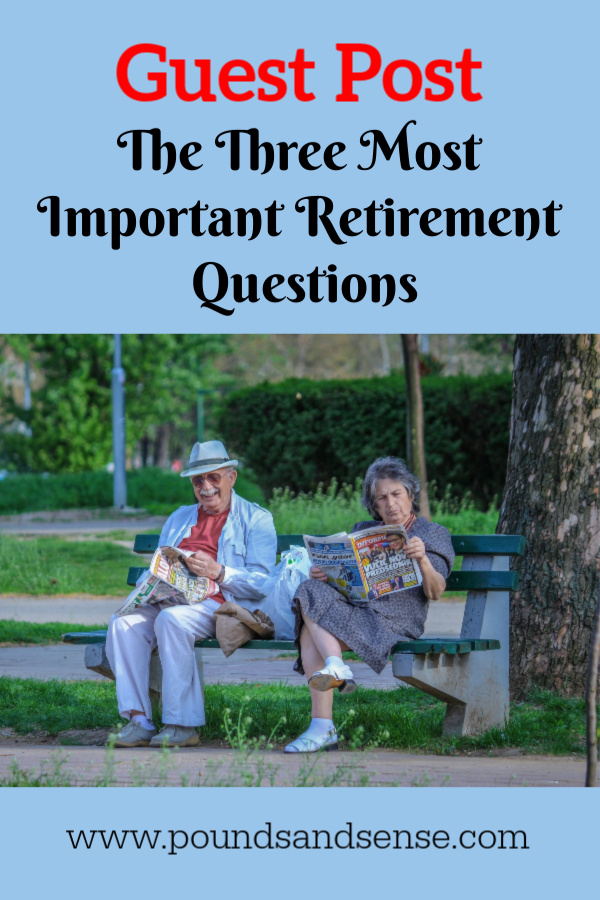Guest Post: The Three Most Important Retirement Questions
Today I have a guest post for you from James Mackay, a certified financial planner and regular reader of Pounds and Sense 🙂
In his article below, James addresses an issue that will be real and pressing for many readers of this blog – how to prepare for retirement and enter it successfully.
Over to James then…
If you’re starting to think about your retirement, these are three important questions that you need to ask.
1. Have You Had Enough?
It’s Sunday evening and you’re winding down after a busy weekend with friends and family. As you sit back in your favourite chair and think about the week ahead, you can’t quite get comfortable.
The thought of going back to work on Monday morning makes you feel a bit uneasy. In fact, the thought of doing it for another 5–10 years makes you feel sick!
If you’ve ever experienced this, you might be approaching the point where you’ve had enough (that’s a technical term).
The question you need to ask yourself is whether the pain of going to work outweighs the benefit. If you find yourself in this situation; where you’re emotionally, physically and mentally drained and no longer excited to perform at the highest level, it’s time to do something about it.
Having had enough doesn’t mean that it’s necessarily time to retire. It simply means that you need to change the status quo.
Maybe you’ve had enough of your current role, but you’ve got more to give in another capacity. Your years of wisdom could be very valuable in a different guise. Perhaps you’ve had enough of having a boss and are ready to go it alone. With the years of experience, it’s no surprise that over 50s are the best entrepreneurs. Or maybe you’re happy to carry on but just want a little bit more flexibility around what you do and when you do it.
These are all useful options to explore, particularly if you haven’t got enough to hang your boots up yet. Sometimes, the benefit of working for “just one more year” can make a real difference to your financial situation.
2. Do You Have Enough?
If you’ve had enough, and are ready to move onto pastures new, the next question is do you have enough?
Whenever I ask this question, people start telling me how much they’ve got saved up. But they’ve got it all wrong. It’s like trying to build a house without the seeing the floor plans. You need to start with the end goal and work back from there.
Working out if you have enough requires knowing:
- Your monthly number – this is how much a comfortable lifestyle is going to cost.
- Your monthly income – this is how much income you’ll receive from the State Pension, final salary pensions, buy to let properties, etc.
- The gap – this is the difference between the two, and where your savings come in. Broadly speaking, if you’ve got 20x the gap in savings, you should be fine. Any less and you might not be quite there yet.
But, there’s more to retirement planning than just simply figuring out your ‘number’. Finding your purpose in retirement sounds wishy-washy, but without a clear purpose you’re likely to be one of the 25% of retirees who return to work.
3. Will You Have Enough to Do?
You need to ask yourself what you are going to do when you wake up on that Monday morning, free from the ties of work, and how are you going to fill your time.
If for the last 40 years you’ve been busy being busy – chances are you’re going to get pretty bored sitting around the house for 40 hours a week. I’ve seen many successful individuals retire, only to get bored and return to work within five years. The newly-found free time that retirement provides can be overwhelming for some.
Retirement is about having enough money to sleep at night and enough purpose to get up in the morning. It’s not just about the numbers, it’s about how you’re going to spend your time. Purpose will drive you in retirement, money will fund you. Try not to get those two mixed up.
The bottom line is this… retirement is the biggest transition you’re ever going to make. It’s not the sort of thing you do regularly and not the sort of thing you want to get wrong. By asking yourself these three questions, you’ll improve your chances of achieving a successful retirement.
Byline: James Mackay is a Certified Financial Planner at Frazer James. He has helped hundreds of clients to achieve financial independence and retire with confidence, clarity and purpose.

Many thanks to James (pictured above) for a valuable and thought-provoking post. As a semi-retired 63-year-old myself, I can identify with all of the points he raises.
Actually I think there is a strong case for phasing your retirement if possible, maybe reducing the number of days per week you work initially and/or moving to a less pressured role. This can make retirement feel more like going on an interesting journey rather than driving over a cliff!
I also think there’s a good case for continuing to do some work you enjoy during the early years of retirement at least, to boost your income, provide social interaction, and keep your mental and physical faculties sharp. Of course, voluntary work can do this as well (apart from boosting your income, which may or may not matter to you).
If you have any comments or questions about this article – for me or for James – as always, do feel free to post them below.


November 6, 2019 @ 7:54 pm
I must admit I have not really thought about my retirement but I am slowly putting together something on the side for the future.
November 7, 2019 @ 11:07 am
Thanks, Miranda. Yes, it’s important to give some thought to retirement from an early age. Money invested relatively early in your career has a lot more time to grow!
November 6, 2019 @ 11:10 pm
These actually are the perfect questions. My Dad retired twice- he went back to work the first time as he just didn’t have enough to do and got bored!
November 7, 2019 @ 11:04 am
Thanks, Rebecca. Yes, I’ve known this happen with other people as well. It’s definitely important to prepare in advance and have a plan for how you will occupy yourself after leaving work. I like James’s comment that retirement is about having enough money to sleep at night and enough purpose to get up in the morning. Those are two essential requirements for a happy and fulfilling retirement.
November 6, 2019 @ 11:22 pm
I definitely need to consider if I have enough for retirement. It is all well and good being ready but not great if I am not financially ready!
November 7, 2019 @ 11:08 am
Thanks, Melissa. Yes, absolutely!
November 7, 2019 @ 11:33 am
I can’t wait to retire and just go on lot’s of walks and read books all day. But I’ll have to work extra hard now, to make sure I’ve got enough money
November 7, 2019 @ 11:39 am
Thanks, Natasha. That sounds great, as long as you combine it with social activities as well. One thing many people find in retirement is that they miss having colleagues to talk to. Loneliness is a problem for many older people, and it’s important to remain socially engaged if you can.
November 7, 2019 @ 1:23 pm
I’d love to retire early and get to travel like my parents do. The freedom and flexibility to do what you want along is very appealing. Not sure that will happen though.
November 7, 2019 @ 1:52 pm
Thanks, Melanie. It’s hard to know what the future holds, but I hope you get your wish.
November 7, 2019 @ 9:13 pm
I really think that retirement is about finding something else to focus on and doing the things that you’ve always wanted to do in your life but not necessarily had the time to do xxx
November 7, 2019 @ 10:51 pm
Many thanks, Laura. From my perspective as a semi-retired 63-year-old I partly agree with this but not entirely. For some people retirement does indeed give them a chance to ‘find something else to focus on’, but for others it may give them the opportunity to devote more time to an already long-standing hobby or interest. Either way, it’s important to make plans for how to occupy all the extra free time that retirement brings.
November 8, 2019 @ 3:34 am
My parents have recently retired and it’s so nice to see them so much more relaxed. They’ve both worked so hard since they were teenagers, they’ve earned this time!
November 8, 2019 @ 8:10 am
Thanks for your comment. That’s good to hear!
November 8, 2019 @ 7:22 am
I don’t think I’ll ever have enough to retire early as it’s so tough to be able to save as much as we’re told we should x
November 8, 2019 @ 8:17 am
Thanks, Rhian. I know it’s not easy for younger people especially as the state pension age keeps on going up. Whatever you can save will help a lot, though. And while it’s not something anyone likes to think about, at some stage you may well inherit some money as well.
November 8, 2019 @ 2:02 pm
I could not agree more, these questions are crucial. I think the state pension age is crazy, way too old and just not realistic x
November 8, 2019 @ 2:06 pm
Thanks, Melanie. One thing is for sure, nobody should be relying on the state pension to fund their retirement.
November 8, 2019 @ 4:05 pm
The thought of retirement terrifies me. I am not planning or saving. I just hope to one day get rich haha
November 8, 2019 @ 4:09 pm
Lol. I hope you do too! Nonetheless, it’s best to start putting a bit aside if you possibly can.
November 8, 2019 @ 10:33 pm
Thinking of retirement is a big step in ones life and needs careful consideration with all the questions you have raised. Very useful post,
November 8, 2019 @ 10:35 pm
Thanks, Nayna. 🙂
November 9, 2019 @ 10:46 am
This is a great interview, I think the way we are at the moment I’ll be working forever haha
November 9, 2019 @ 11:18 am
Thanks, Jenni. I hope not!
November 11, 2019 @ 9:46 am
Gosh, the way you put it about having things to do during the day, that’s something I’ve never thought about before. Seems like there’s a fair bit to think about before retirement.
November 11, 2019 @ 10:43 am
Thanks, Rachael. Yes, it’s important to be well prepared!
November 13, 2019 @ 6:13 am
Both my husband and I have good pension plans but they keep extending the retirement age which is very frustrating
November 13, 2019 @ 7:34 am
Thanks, Kara. It’s true that the state pension age keeps going up, but if you have good pension schemes you may be able to retire earlier on these using the new pension freedoms. Everyone’s circumstances are different, so it’s important to educate yourself about the options available and take professional independent advice as well.
3 Important retirement questions you need to ask yourself - Frazer James
June 29, 2023 @ 11:28 am
[…] This article on the 3 most important retirement questions was originally featured as a guest post on Pounds and Sense. […]